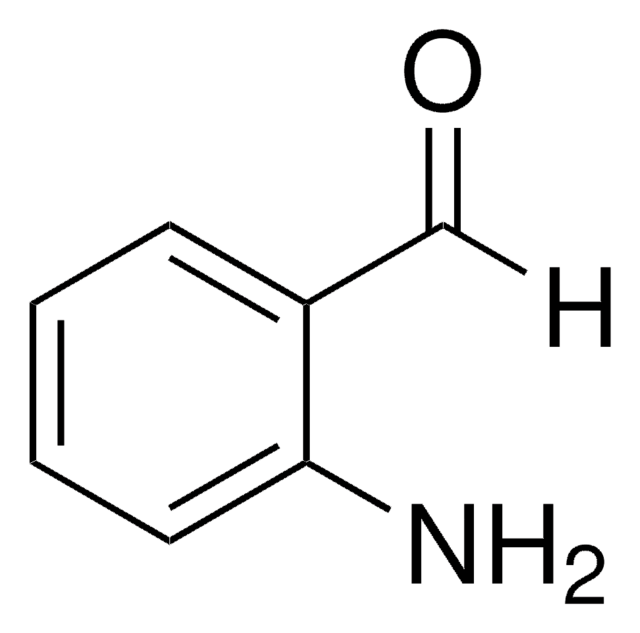162663
DL-2-Aminobutyric acid
99%, for peptide synthesis, ReagentPlus®
Synonym(s):
AABA, Homoalanine, alpha-amino-n-butyric acid
Sign Into View Organizational & Contract Pricing
All Photos(1)
About This Item
Linear Formula:
C2H5CH(NH2)CO2H
CAS Number:
Molecular Weight:
103.12
Beilstein:
635889
EC Number:
MDL number:
UNSPSC Code:
12352116
PubChem Substance ID:
NACRES:
NA.22
Recommended Products
product name
DL-2-Aminobutyric acid, ReagentPlus®, 99%
Quality Level
product line
ReagentPlus®
Assay
99%
form
solid
reaction suitability
reaction type: solution phase peptide synthesis
mp
291 °C (dec.) (lit.)
application(s)
peptide synthesis
SMILES string
CCC(N)C(O)=O
InChI
1S/C4H9NO2/c1-2-3(5)4(6)7/h3H,2,5H2,1H3,(H,6,7)
InChI key
QWCKQJZIFLGMSD-UHFFFAOYSA-N
Looking for similar products? Visit Product Comparison Guide
General description
DL-2-Aminobutyric acid also known as α-aminobutyric acid, is commonly used in solution-phase peptide synthesis.
Application
DL-2-Aminobutyric acid can be used to synthesize 2-(2,5-dioxopyrrolidin-1-yl) butanoic acid.
Legal Information
ReagentPlus is a registered trademark of Merck KGaA, Darmstadt, Germany
Storage Class Code
11 - Combustible Solids
WGK
WGK 3
Flash Point(F)
Not applicable
Flash Point(C)
Not applicable
Personal Protective Equipment
dust mask type N95 (US), Eyeshields, Gloves
Choose from one of the most recent versions:
Already Own This Product?
Find documentation for the products that you have recently purchased in the Document Library.
Customers Also Viewed
Ryan J Martinie et al.
Journal of the American Chemical Society, 137(21), 6912-6919 (2015-05-13)
The iron(II)- and 2-(oxo)glutarate-dependent (Fe/2OG) oxygenases catalyze an array of challenging transformations, but how individual members of the enzyme family direct different outcomes is poorly understood. The Fe/2OG halogenase, SyrB2, chlorinates C4 of its native substrate, l-threonine appended to the
Fatemeh Mahmoodani et al.
Journal of food science and technology, 51(9), 1847-1856 (2014-09-06)
Skin and bone gelatins of pangasius catfish (Pangasius sutchi) were hydrolyzed with alcalase to isolate Angiotensin Converting Enzyme (ACE) inhibitory peptides. Samples with the highest degree of hydrolysis (DH) were separated into different fractions with molecular weight cut-off (MWCO) sizes
Christian Rausch et al.
Proteins, 81(5), 774-787 (2012-12-15)
Apart from their crucial role in metabolism, pyridoxal 5'-phosphate (PLP)-dependent aminotransferases (ATs) constitute a class of enzymes with increasing application in industrial biotechnology. To provide better insight into the structure-function relationships of ATs with biotechnological potential we performed a fundamental
Kun Huang et al.
The Journal of biological chemistry, 282(48), 35337-35349 (2007-09-22)
The contribution of the insulin A-chain to receptor binding is investigated by photo-cross-linking and nonstandard mutagenesis. Studies focus on the role of Val(A3), which projects within a crevice between the A- and B-chains. Engineered receptor alpha-subunits containing specific protease sites
Young-Man Seo et al.
Organic & biomolecular chemistry, 10(12), 2482-2485 (2012-02-22)
A deracemization method was developed to generate optically pure L-homoalanine from racemic homoalanine using D-amino acid oxidase and ω-transaminase. A whole cell reaction using a biphasic system converted 500 mM racemic homoalanine to 485 mM L-homoalanine (>99% ee).
Our team of scientists has experience in all areas of research including Life Science, Material Science, Chemical Synthesis, Chromatography, Analytical and many others.
Contact Technical Service
